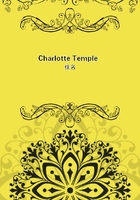
第9章
SUCH THINGS ARE.
MISS Weatherby was the only child of a wealthy man, almost idolized by her parents, flattered by her dependants, and never contradicted even by those who called themselves her friends:
I cannot give a better description than by the following lines.
The lovely maid whose form and face Nature has deck'd with ev'ry grace, But in whose breast no virtues glow, Whose heart ne'er felt another's woe, Whose hand ne'er smooth'd the bed of pain, Or eas'd the captive's galling chain;But like the tulip caught the eye, Born just to be admir'd and die;When gone, no one regrets its loss, Or scarce remembers that it was.
Such was Miss Weatherby: her form lovely as nature could make it, but her mind uncultivated, her heart unfeeling, her passions impetuous, and her brain almost turned with flattery, dissipation, and pleasure;and such was the girl, whom a partial grandfather left independent mistress of the fortune before mentioned.
She had seen Temple frequently; and fancying she could never be happy without him, nor once imagining he could refuse a girl of her beauty and fortune, she prevailed on her fond father to offer the alliance to the old Earl of D----, Mr. Temple's father.
The Earl had received the offer courteously: he thought it a great match for Henry; and was too fashionable a man to suppose a wife could be any impediment to the friendship he professed for Eldridge and his daughter.
Unfortunately for Temple, he thought quite otherwise:
the conversation he had just had with his father, discovered to him the situation of his heart; and he found that the most affluent fortune would bring no increase of happiness unless Lucy Eldridge shared it with him; and the knowledge of the purity of her sentiments, and the integrity of his own heart, made him shudder at the idea his father had started, of marrying a woman for no other reason than because the affluence of her fortune would enable him to injure her by maintaining in splendor the woman to whom his heart was devoted:
he therefore resolved to refuse Miss Weatherby, and be the event what it might, offer his heart and hand to Lucy Eldridge.
Full of this determination, he fought his father, declared his resolution, and was commanded never more to appear in his presence.
Temple bowed; his heart was too full to permit him to speak;he left the house precipitately, and hastened to relate the cause of his sorrows to his good old friend and his amiable daughter.
In the mean time, the Earl, vexed to the soul that such a fortune should be lost, determined to offer himself a candidate for Miss Weatherby's favour.
What wonderful changes are wrought by that reigning power, ambition! the love-sick girl, when first she heard of Temple's refusal, wept, raved, tore her hair, and vowed to found a protestant nunnery with her fortune; and by commencing abbess, shut herself up from the sight of cruel ungrateful man for ever.
Her father was a man of the world: he suffered this first transport to subside, and then very deliberately unfolded to her the offers of the old Earl, expatiated on the many benefits arising from an elevated title, painted in glowing colours the surprise and vexation of Temple when he should see her figuring as a Countess and his mother-in-law, and begged her to consider well before she made any rash vows.
The DISTRESSED fair one dried her tears, listened patiently, and at length declared she believed the surest method to revenge the slight put on her by the son, would be to accept the father:
so said so done, and in a few days she became the Countess D----.
Temple heard the news with emotion: he had lost his father's favour by avowing his passion for Lucy, and he saw now there was no hope of regaining it: "but he shall not make me miserable," said he.
"Lucy and I have no ambitious notions: we can live on three hundred a year for some little time, till the mortgage is paid off, and then we shall have sufficient not only for the comforts but many of the little elegancies of life. We will purchase a little cottage, my Lucy,"said he, "and thither with your reverend father we will retire; we will forget there are such things as splendor, profusion, and dissipation:
we will have some cows, and you shall be queen of the dairy;in a morning, while I look after my garden, you shall take a basket on your arm, and sally forth to feed your poultry; and as they flutter round you in token of humble gratitude, your father shall smoke his pipe in a woodbine alcove, and viewing the serenity of your countenance, feel such real pleasure dilate his own heart, as shall make him forget he had ever been unhappy."Lucy smiled; and Temple saw it was a smile of approbation.
He sought and found a cottage suited to his taste; thither, attended by Love and Hymen, the happy trio retired; where, during many years of uninterrupted felicity, they cast not a wish beyond the little boundaries of their own tenement. Plenty, and her handmaid, Prudence, presided at their board, Hospitality stood at their gate, Peace smiled on each face, Content reigned in each heart, and Love and Health strewed roses on their pillows.
Such were the parents of Charlotte Temple, who was the only pledge of their mutual love, and who, at the earnest entreaty of a particular friend, was permitted to finish the education her mother had begun, at Madame Du Pont's school, where we first introduced her to the acquaintance of the reader.